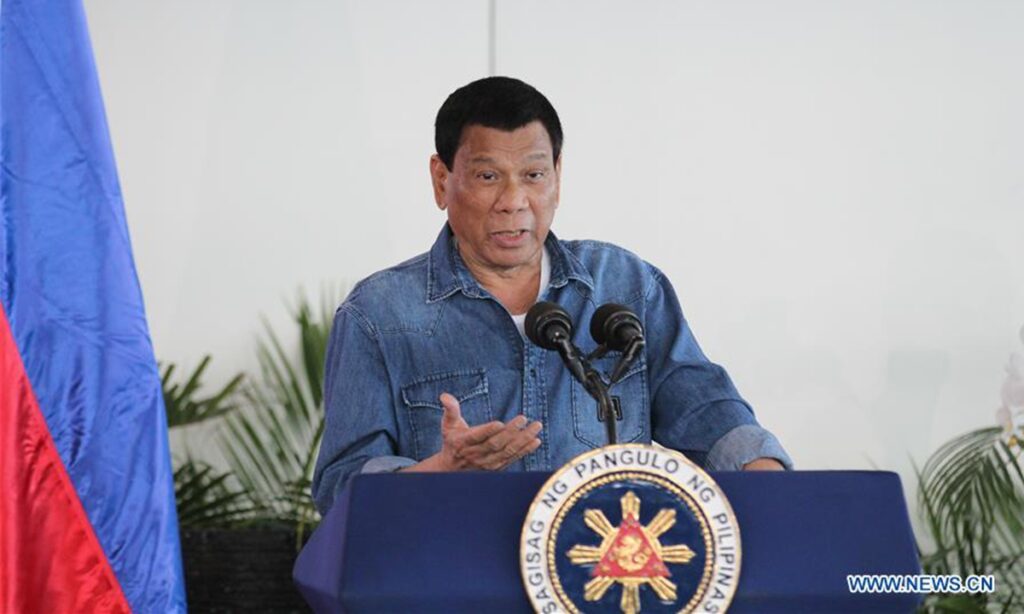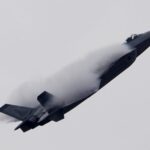The Philippine President Rodrigo Duterte’s annual State of the Nation Address, delivered on Monday, sent a clear signal of the country’s pursuit of an independent foreign policy, or of balanced diplomacy among major powers. This is, without doubt, based on the country’s national interests.
Duterte suggested that the Philippines should treat the South China Sea issue with diplomatic endeavors. This has been Duterte’s consistent South China Sea policy. It mirrors that US’ attempt to interfere in regional affairs by utilizing the Philippines as leverage as well as roping in Manila to gang up on China, does not work.
Another proof is Duterte’s straightforward opposition against the American military going back to Subic Bay, which used to host one of the largest US naval facilities in the world before it was shut down in 1992. The reason, according to Duterte, is that once a military base is put up there, atomic arsenals will be brought in once a war breaks out and “this will ensure the extinction of the Filipino race.”
The US has treated the Philippines as having a vital role in the front line of US’ Indo-Pacific Strategy. It has thus been hoping to go back to its previous military base in the Philippines.
According to some US’ observers, an essential Indo-Pacific strategy involves securing the first chain of major archipelagos next to the East Asian continent, including the Philippines.
That’s why the US Navy announced in June 2019 that it was “exploring the viability of a shipyard in Subic Bay for use as a potential repair and maintenance facility,” US’ military newspaper Stars and Stripes reported in January, noting “the strategic harbor’s importance has grown.” It continued to note that after the shutdown of Subic Bay, it is still “a regular port call for US warships and for Marines who practice beach landings nearby in Zambales province.” However, Duterte’s remarks are without doubt a blow to US wishful thinking.
The US must wake up to the fact that it cannot return to the bay on its own will. It has to respect the will of Filipinos, and Duterte has expressed his people’s will plainly.
In February, Manila announced that it would terminate the US-Philippines Visiting Forces Agreement – a deal that makes it more convenient for the US to send military forces to the Philippines and authorizes the US military to have freedom of movement into and within the country. Duterte’s spokesman Salvador Panelo said that “reliance on another country for our own defenses against the enemies of the state will ultimately weaken and stagnate our defense mechanisms… We must stand on our own.”
Manila is quite sober. The long-term alliance with the US has not brought the Philippines much benefit. On the contrary, the US has only been taking advantage of ties with the Philippines to keep interfering in regional affairs, stirring up troubles from time to time. Worse, there have also been scandals of US soldiers raping local women, triggering local people’s aversion toward US’ troops.
In contrast, the cooperation between China and the Philippines is based on their common interests. It is not exclusive and is based on the Philippines’ needs.
The two countries are now coordinating the China-proposed Belt and Road Initiative and the Philippines’ “Build, Build, Build” infrastructure program. Building roads, bridges, airports, seaports and railways are now what the Philippines’ urgently needs and China is a vital source of funding for those infrastructure projects. The Philippines has been promoting its anti-drugs campaign, and China has helped finance the building of drug treatment and rehabilitation centers there. In terms of anti-terrorism, China has provided the Philippines with batches of weapons.
From the perspective of national interests, Manila is now adjusting its policies toward Washington, shifting its previous stance of siding with the US to a more balanced diplomacy. This will be a long-term trend, as it represents the mainstream people’s will.
It means US’ attempt to disturb the South China Sea affairs is suffering from a setback. But the US will hardly stop and will only try harder to rope in some other Western countries to meddle in the South China Sea – for which China should be fully prepared.
The article was compiled by Global Times reporter based on an interview with Xu Liping, director of the Center for Southeast Asian Studies of the Chinese Academy of Social Sciences. opinion@globaltimes.com.cn
Philippine President Rodrigo Duterte speaks during a news conference in Davao City, the Philippines, April 9, 2018. Philippine President Rodrigo Duterte said that he foresees the relations between China and the Philippines to “bloom into something like a big and beautiful flower” in the coming months. Photo: Xinhua



